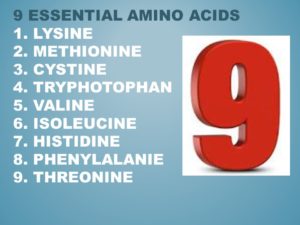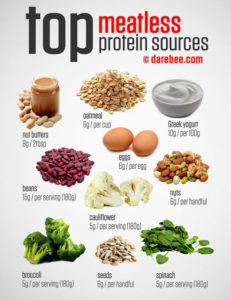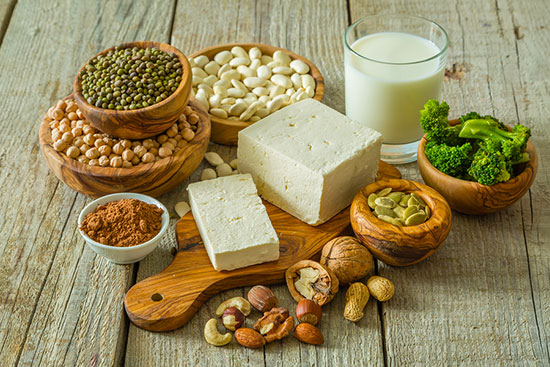Good nutrition is vital to a healthy lifestyle, especially after bariatric surgery. It is important that individuals who have had weight loss surgery consume a diet that is rich in protein and low in simple carbs and sugars. Lately, the staff at the Bariatric Center of Kansas City have been discussing the merits of various diets and one in particular has created a rather interesting dialogue – can a vegetarian diet be a healthy choice post bariatric surgery?
After bariatric surgery, you want foods packed with nutrition in a relatively small portion, which is why meats like chicken and turkey are so effective. A 4-ounce portion can provide ample protein and the 9 essential amino acids your body cannot synthesize; however, many people struggle to comfortably eat meat after bariatric surgery and turn to a vegetarian diet. Since the goal, post bariatric surgery, is to maintain a healthy balance of protein, carbohydrates, sugar, etc. a vegetarian diet may present “balance” issues as certain proteins only come from animal products.
Complete Protein Vs Incomplete Protein
 Each protein molecule we consume is made up of individual building blocks called amino acids. Some of these amino acids can be synthesized in the body, while others you MUST get from food. There are 9 essential amino acids that you must get from food. A protein that contains all 9 essential amino acids is called a “complete protein” and most of these come from animals or animal by-products such as, cheese, Greek yogurt, and eggs.
Each protein molecule we consume is made up of individual building blocks called amino acids. Some of these amino acids can be synthesized in the body, while others you MUST get from food. There are 9 essential amino acids that you must get from food. A protein that contains all 9 essential amino acids is called a “complete protein” and most of these come from animals or animal by-products such as, cheese, Greek yogurt, and eggs.
The challenge with a plant-based diet is in consuming the type of proteins the body requires to thrive. While meats and animal products contain “complete proteins”. Most proteins that come from plants are “incomplete”. They contain only some of the essential amino acids. Since the body cannot synthesize an essential amino acid, you will have to consume a variety of plants to get all 9 essential amino acids in your daily diet.
Example: Almonds/almond butter is a source of protein but lacks the amino acids lysine and methionine…Pumpkin seeds are a complete protein and sunflower seeds contain methionine, therefore all amino acids are accounted for and both are considered low in carbohydrates.
Vegetarian Type Predicts Dietary Challenges After Bariatric Surgery
Some patients struggle with eating meat after bariatric surgery and others simply get tired of just eating meat. If you choose to go vegetarian or just want to add some vegetarian options to your diet, be prepared for a variety vegetarian types, which leads to a variety of food challenges. Each type (or title) is based on what is consumed. It is important to understand the type of vegetarian diet you choose so you can make healthy choices to achieve your daily dietary goals.
This list should help you understand what is meant when you read through a recipe or select a cookbook.
Vegan: Avoids ALL animal products (fish, eggs, milk, meat, poultry, gelatin, or anything made from animals)
Vegetarian: Does not eat animal flesh but may consume other animal-based foods like eggs and dairy
Lacto-ovo vegetarian: Eats dairy and eggs
Lacto-vegetarians: Eats dairy but not eggs
Ovo-vegetarian: Eats eggs but not dairy
Flexitarians: Eat mostly plant based foods, but occasionally eat meat, poultry, or fish
Semi-vegetarians: exclude some meat (usually red meat) but still consume limited amounts of poultry, fish, and/or seafood.
When choosing a vegetarian recipe after bariatric surgery, make sure it contains all the essential amino acids. Adding eggs, dairy and soy will make them complete and a serving size is about ½ cup. Limit soy-based vegetarian options to 3 – 4 a week as soy products can mimic the effects of estrogen. Continue to follow the guidelines your doctor has given you. Try to get in 20 gm of protein a meal, but getting a total of 45 gm of protein a day is adequate for most folks.
Some low carbohydrate, high protein snack options include:
¼ cup pistachios
¼ cup edamame (soy based)
1 mozzarella cheese stick
1 Tbs peanut butter
¼ cup skim Fairlife milk
¼ olives with 1 ounce of cheese
The Bariatric Center of Kansas City believes you can eat a vegetarian diet after bariatric surgery. However, it will require careful planning to make sure your diet includes key nutrients. Additional supplements may be required. Be adventurous, enjoy some new vegetarian recipes and live life to its fullest. Just follow these “Golden Rules”:
- Ensure that all 9 essential amino acids are met through the diet by choosing a VARIETY of plant sources and/or incorporating eggs/dairy/soy
- Limit soy based meals to 3-4x/wk
- Try not to exceed 20g carbohydrate per meal
- Ensure you are meeting daily protein goal of 45-50g, supplementing if necessary
- Ensure you are taking 2 Journey vitamins/day and 3 calcium citrate/day, and drinking at least 64oz/day
- Remember not to snack between meals to avoid weight regain
- If you are someone who is eating vegetarian due to lack of tolerance of meat alone, continue to try and reintroduce until it is tolerated to ensure gut healing.
Recipes and More:
- yummly.com
- foodcoach.me
- self.com
- The Complete Idiot’s Guide to Plant-Based Nutrition by Jlieanna Hever, MS., RD, CPT
- Vegetarian Options after Bariatric Surgery, Original Presentation, June 5, 2018 – Faciliator: Annie Epp, RD, LD
To learn more about bariatric surgery, contact The Bariatric Center of Kansas City.









